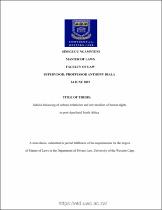| dc.contributor.advisor | Diala, Anthony | |
| dc.contributor.author | Ngamnteni, Sinegugu | |
| dc.date.accessioned | 2022-10-12T07:35:40Z | |
| dc.date.available | 2022-10-12T07:35:40Z | |
| dc.date.issued | 2022 | |
| dc.identifier.uri | http://hdl.handle.net/11394/9350 | |
| dc.description | Magister Legum - LLM | en_US |
| dc.description.abstract | Globalisation did not only bring about major political, social and economic changes; it also strengthened the global reach of universalism of human rights. The concept of universal human rights is presently reconstructing the world order and reshaping national constitutions worldwide. Universalism is based on the ideology that human rights should be recognised universally and applied to all cultures. In opposition, cultural relativism posits that the notion of universal human rights is a Western idea that should not apply to all cultures of the world, as every culture has its own moral standards that are perceived as acceptable or unacceptable in the specific contexts of the people identifying it. The concept of universal human rights has been embodied in constitutions of almost all countries. In particular, the Constitution of the Republic of South Africa has been influenced by a universalist approach to human rights. | en_US |
| dc.language.iso | en | en_US |
| dc.publisher | University of the Western Cape | en_US |
| dc.subject | African customary law | en_US |
| dc.subject | Bill of rights | en_US |
| dc.subject | Human rights | en_US |
| dc.subject | Post-Apartheid | en_US |
| dc.subject | South Africa | en_US |
| dc.title | Judicial balancing of cultural relativism and universalism of human rights in post-Apartheid South Africa | en_US |
| dc.rights.holder | University of the Western Cape | en_US |

